Enneagram Tri-Center 4-7-9: Heart Type 4, Head Type 7, Gut Type 9
The 4-7-9 Tri-Center
-
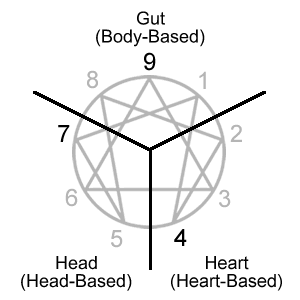
Your tri-center consists of your dominant type in each of the three centers of intelligence with a preferred ordering of the centers (types). The preferred ordering of the 4-7-9 is:
Heart Type: Type 4
-
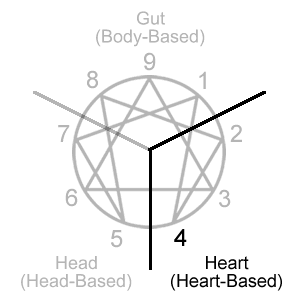
Type 4 is located in the 234 triad which is often described as the heart or heart-based center.
The heart types are focused on interpreting, expressing, and reacting to one’s own emotions or the emotions of others. More specifically, the heart center focuses on what's emotionally significant in the sense that emotions are an indication of how strongly a person resonates with or against something or someone.
This may involve being attentive to the emotional needs and desires of others, seeking emotional affirmation for oneself from others, and expressing one's own unique emotional impression of the world.
Type 4 has emotional impressions of the world which create a rich internal emotional reality. They base their sense of self on this. To express or share this inner emotional world is to share oneself. It can be challenging however to find a way to do this. It can seem like others don't have this same emotional senistivity which can also make the type 4 feel different from other people. This sense of difference can alternate between feeling defective and feeling special.
Type 4 Shame
The shame triad consists of types 2, 3, and 4. Shame for these types involves the heart center. It can be thought of as a feeling of deficiency for not living up to a more idealized sense of self.
This may involve initiating connection with others to avoid feeling unlovable or unimportant in the lives of others, finding value and worth through performance and accomplishment, and finding significance by cultivating and expressing one's uniqueness.
Type 4 shame comes from feeling different from others. It can seem like others are more capable in areas that the type 4 is not. This can sometimes lead to a sense of defectiveness. In compensation, they may search for what makes them uniquely special and try to live from that sense of self instead.
To learn more about Enneagram personality type 4 click here.
Head Type: Type 7
-
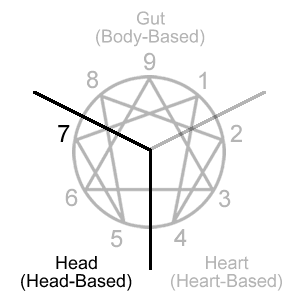
Type 7 is located in the 567 triad which is often described as the head or head-based center.
Although the head types can be thought of in terms of reasoning, analyzing, and other typical thinking functions, a useful distinction from the other two centers can be made in terms of anticipating and preparing for future possibilities.
This may involve gathering data and facts in order to better predict outcomes, preparing for negative potentialities that might occur, and planning or pursuing activities that provide enjoyment and avoid discomfort.
Type 7 avoids pain and limitations while seeking what's interesting and exciting. It's hard to commit to just one thing. Options are kept open because there's always the possibility of an interesting opportunity suddenly presenting itself. When interest in what's going on begins to wane then attention can quickly turn to what's next. There can be a living in the future approach to life where the type 7 wants to always have something exciting to look forward to.
Type 7 Fear
The fear triad consists of types 5, 6, and 7. Fear for these types involves the head center. It can be thought of as a negative anticipation of future possibilities and wanting to prepare for or avoid those possibilities.
This may involve learning as much as possible in order to feel competent and knowledgeable, imagining worst-case scenarios and preparing for them, and having alternatives available to avoid being trapped in discomfort or pain.
Type 7 has a fear of pain, boredom, and limitation. The future is anticipated and choices are made that avoid the negative and pursue the positive. Often when a choice has the possibility of going down a path that leads to what's feared, they'll quickly choose another path or distraction that avoids it.
To learn more about Enneagram personality type 7 click here.
Gut Type: Type 9
-
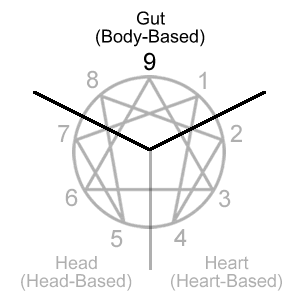
Type 9 is located in the 891 triad which is often described as the gut or body-based center.
There are several ways to interpret what the gut or body types represent. They may be thought of in terms of sensory-somatic (bodily felt sensation), sensory-motor (physical movement and activity), or instinctual (gut decision making).
This may involve taking action based on one's gut instinct, getting pulled along by the agenda of others, and actively trying to correct what's seen as wrong in the world.
Type 9 often seeks physical comfort and routine. There can be an inertia when it comes to physical activity. When at rest they tend to stay at rest and when moving they tend to maintain that movement. In other words, they may stubbornly resist doing what they don't want to and fall into routines which they dislike having interrupted. They often have difficulty setting and following through on personal goals. Instead, there can be a tendency to get carried along on the energy and agenda of others.
Type 9 Anger
The anger triad consists of types 8, 9, and 1. Anger for these types involves the gut or body center. It can be thought of as an energy of will that pushes against obstacles to create movement or resists being pushed.
This may involve pushing through obstacles to get what one wants, stubbornly resisting attempts to be pushed in an undesired direction, and getting people to see what's right and correcting things not done right.
Type 9 is said to fall asleep to their anger. Because they generally don't have a strong personal agenda, they tend to simply go along to get along instead of making an effort to overcome obstacles in pursuit of a goal. However, they can push back in resistance, through a stubbornness or passive-aggressiveness, when they are confronted to do something they don't want to.
To learn more about Enneagram personality type 9 click here.
4-7-9 Tri-Center Focus
-
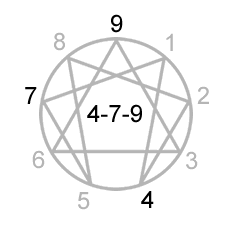
Expressing-Anticipating-AccommodatingThe tri-center focus looks at your dominant type in each center through the core focus.
-
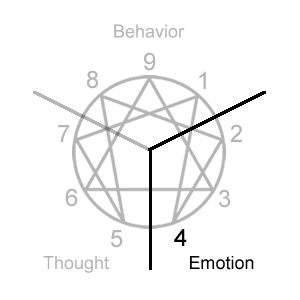
Type 4 Initial Self-Belief: “I am lacking as I am.”
Type 4 Compensation: "I must find and cultivate what's authentic and uniquely special about myself to stand out from the ordinary."
Type 4 Core Focus: Significance comes from cultivating what is unique and emotionally authentic in myself. This requires that I discover and stay true to what has emotional meaning for me and find ways to express that through my own identity and in the world around me.
Personality characteristics that might arise from the type 4 core focus:
- Cultivates and maintains moods they identify with
- Holds in disdain what's common in pursuit of what's special
- Stirs up or intensifies emotional states to feel more alive
- Feels more emotionally sensitive and deeper than others
- Takes things personally even when not intended that way
- Notices what's missing or lacking in self compared to others
- Creates idealized self from what they emotionally resonate with
- Looks for ways to express their inner emotional world
- Wants to deal with internal emotions before moving forward
-
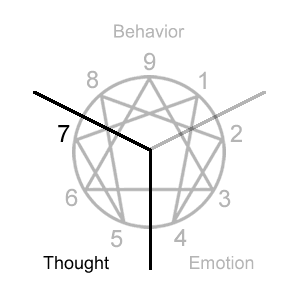
Type 7 Initial Self-Belief: “I am not satisfied as I am.”
Type 7 Compensation: "I must stay open to exciting possibilities that may become available in life and avoid limitations on my pursuits."
Type 7 Core Focus: Enthusiasm comes from possibilities that lead to something interesting, exciting, or satisfying. This requires that I anticipate whether a path might lead to something positive or negative. The positives are pursued while the negatives are avoided, reframed, or escaped from.
Personality characteristics that might arise from the type 7 core focus:
- Likes to keep options open for fear of missing out in life
- Escapes pain and boredom by quickly moving on to something else
- Avoids commitments/obligations that feel limiting and restrictive
- Equalizes relationships with authority to avoid being limited by them
- Attempts to lighten up situations when they become too serious
- Mind quickly jumps between possibilities when excited about an idea
- Lives in anticpation of fun and exciting future possibilities
- Difficulties following through to completion on projects
- Skates on the surface of feelings for fear of getting stuck in them
-
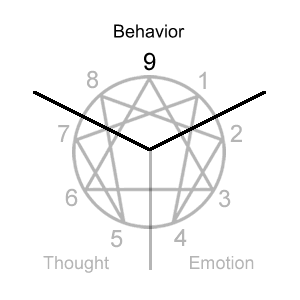
Type 9 Initial Self-Belief: “I am not in unity as I am.”
Type 9 Compensation: "I must accommodate others' agenda and opinions in order to feel at ease and in harmony with them."
Type 9 Core Focus: Harmony comes from getting along with others and falling into comfortable routines. This requires that I accommodate others by finding common ground and minimizing my own agenda when around others as well as finding comfort and peace of mind for myself.
Personality characteristics that might arise from the type 9 core focus:
- Loses sight of own agenda in favor of the agenda of others
- Smooths over conflict in order to keep the peace and feel more at ease
- Has difficulty establishing goals and following through on them
- Struggles with inertia: getting going or changing course once underway
- Gets lost in peripheral activities that don't serve the primary objective
- Avoids creating separation from people by going along to get along
- Supresses anger which may surface as stubbornness or passive-aggressiveness
- Finds it difficult to prioritize because everything can seem equally important
- Numbs themself through comfort seeking and getting lost in routine
Heart Focus: Emotional Authenticity
Type 4 - Significance through Emotional Authenticity
Head Focus: Mental Possibility
Type 7 - Enthusiasm through Mental Possibility
Gut Focus: Behavioral Accommodation
Type 9 - Harmony through Behavioral Accommodation
To learn more about the centers and your center types click on a link below.
Enneagram Tests to Help Determine Centers
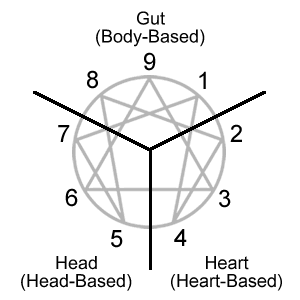
The Enneagram personality types group the nine types into three centers of intelligence often referred to as the gut, heart, and head centers.
These tests help you find your dominant type in each center and the order of preference for those centers.
-
Dominant Type in Each Center with Wings Test
This test determines your dominant type in each center (aka tri-center, trifix, tritype, truetype) along with the wings of those types.
Use when you want to know your tri-center or tri-center with wings. -
Enneagram Type Preference Test
This test produces a scored list of all nine types.
Questions are forced-choice, similar to the method used by the Riso-Hudson Enneagram Type Indictor (RHETI).
Use to determine type, wings, gut/heart/head types, and tri-center. -
Center Type Comparison Test
This test scores the three types in a given center to determine your dominant type within that center (gut, heart, or head type).
Use when you don't know your dominant type for one of the centers. -
Type Comparison Test
This test compares any two types, producing a score for each.
Use when unsure of your tri-center order or which of two types is preferred for a center.
Click here for the Complete Guide to the Enneagram.
This free guide explains- the nine Enneagram personality types
- the many type variations within type
- where the types came from (origins and history)
- how the types use the Enneagram symbol
Click here for Enneagram tests.
These free tests help you find your- primary type
- candidate types
- preferred wing
- intinctual subtype
- instinctual variant stacking
- center types (gut, heart, and head)
- tri-center with wings